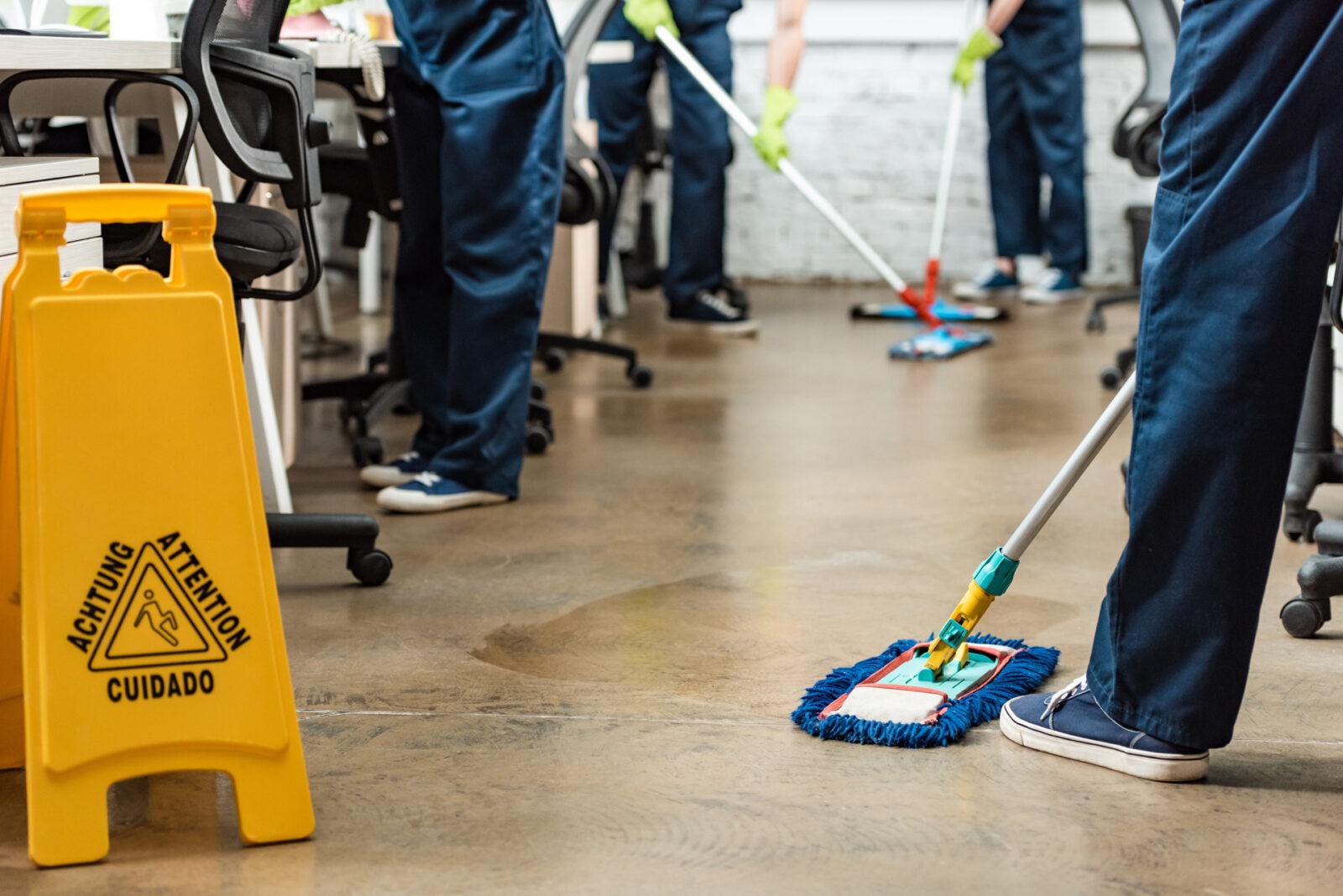Picture this: you walk into a bustling business, greeted by shiny floors that reflect a commitment to cleanliness and professionalism. Clean floors in a commercial setting are not just about aesthetics; they’re a reflection of your commitment to customer satisfaction and employee well-being.
According to a recent study, 90% of customers believe that the cleanliness of a business directly correlates with its overall quality and service. This underlines the importance of maintaining spotless floors in a commercial environment.
Commercial floors face constant challenges—daily foot traffic, dirt, spills, and stains. Keeping up with these demands is no easy task, but it’s a crucial aspect of managing a successful business.
In this article, we explore two solutions: DIY floor care and professional services. Each has its own set of advantages and disadvantages, and the choice between the two depends on individual needs and resources.
DIY Floor Care: Taking Matters into Your Own Hands

Understanding DIY Floor Care
“DIY Floor Care” refers to the practice of handling the cleaning and maintenance of commercial floors in-house or by the business itself. It stands for “Do It Yourself,” indicating that the responsibility for maintaining cleanliness and hygiene on the floors is undertaken by the business owners, facility managers, or designated personnel within the organization. This approach involves using self-managed cleaning schedules, choosing cleaning products, and performing the cleaning tasks independently without outsourcing the services to professional cleaning companies or individuals.
DIY Floor Care is often chosen for its potential cost savings and the flexibility it offers in terms of control over cleaning practices.
Pros of DIY Floor Care
Cost-effective
For small businesses or those with infrequent cleaning needs, the potential for cost savings is a compelling reason to consider a DIY approach. By handling floor care in-house, you can allocate funds to other critical areas of your business.
Control and Flexibility
DIY floor care allows for complete control over cleaning schedules, product choices, and methods. This flexibility is valuable, especially for businesses with unique cleaning requirements or specific preferences for certain cleaning products.
Sense of Accomplishment
There’s a sense of satisfaction in managing cleaning tasks independently. It fosters a hands-on approach to maintaining your business environment, promoting a culture of responsibility and pride among employees.
Cons Of DIY Floor Care
Time commitment
One of the significant drawbacks of DIY floor care is the substantial time investment required. Cleaning, scheduling, and equipment maintenance can be time-consuming, potentially diverting resources from core business activities.
Lack of Expertise
Not everyone is a cleaning expert. DIY attempts may lead to improper cleaning techniques or the use of inadequate equipment, resulting in potential damage or ineffective results.
Limited Resources
Accessing professional-grade equipment or specialized cleaning products for specific floor types can be challenging. DIY cleaners may find themselves at a disadvantage when dealing with unique flooring materials.
Professional Floor Care: Expertise at Your Service

Understanding Professional Floor Care
Professional Floor Care refers to outsourcing the cleaning and maintenance of commercial floors to specialized and experienced cleaning professionals or service providers. This approach involves hiring experts who possess the knowledge, skills, and specialized equipment to ensure thorough and efficient cleaning of various floor types.
Note that, commercial floor care services are typically provided by commercial cleaning companies that offer expertise in handling different flooring materials and utilize advanced cleaning techniques. This option is chosen for its promise of high-quality results, convenience, and the assurance that trained professionals will address the specific needs of the commercial space, contributing to a clean and well-maintained environment.
Pros of Professional Floor Care
Quality and Efficiency
Professional cleaners bring expertise and experience to the table, ensuring thorough and efficient cleaning with minimal disruption to your business operations.
Specialized Equipment and Techniques
Professionals use advanced equipment and specialized cleaning methods tailored to different floor types, guaranteeing optimal results and extending the lifespan of your floors.
Reduced Risk of Damage
The risk of damage due to improper cleaning methods is significantly lower when you enlist the services of professionals. They are trained to handle delicate floor materials with care.
Convenience and Peace of Mind
Outsourcing your floor care to professionals frees up time and resources for other crucial tasks. You can focus on running your business while having peace of mind knowing that experts are maintaining your floors.
Cons of Professional Floor Care
Cost
The primary drawback of professional floor care is the cost. Hiring experts comes at a higher price compared to DIY methods. However, the investment often pays off in the form of quality results and time savings.
Limited Control
When opting for professional services, there might be a loss of control over specific cleaning schedules or product choices. It’s essential to communicate your preferences clearly and choose a service provider that accommodates your needs.
Finding the Right Service
Selecting a reliable and qualified professional service provider is crucial. A wrong choice could lead to subpar results or even damage to your floors. Thorough research and recommendations are necessary to find the right fit.
Making the Right Choice: Factors to Consider
Budget
Evaluate the financial aspects wisely. DIY may appear cost-effective, but factor in potential mistakes and the value of your time. Professional services, though pricier upfront, often translate to long-term savings. Their expertise ensures efficient and high-quality results, justifying the investment. Consider the overall impact on your budget and weigh the benefits of each option to make an informed decision tailored to your business’s financial constraints and long-term goals.
Floor Types
Assess the unique needs of your diverse flooring materials—carpet, tile, wood, or others. DIY cleaning might lack specialized knowledge for each type, potentially causing damage. Professional cleaners bring expertise, using tailored methods for different surfaces. Their understanding of specific floor care ensures optimal results, extending the longevity of your floors. Consider the composition and intricacies of your floors when deciding between DIY and professional services, prioritizing the preservation and enhancement of each specific type in your commercial space.
Cleaning Frequency and Needs
Evaluate the demands of your business environment by considering foot traffic, dirt levels, and potential spills. DIY cleaning may require significant time and effort to meet these needs consistently. Professional services offer customized cleaning schedules, ensuring thorough and timely maintenance tailored to your specific requirements.
By assessing the frequency and intensity of cleaning necessary for your commercial space, you can determine whether in-house efforts or professional assistance align better with your business’s demands, ultimately contributing to a cleaner and more inviting environment.
Available Time and Resources
Assess the resources at your disposal, considering both time and personnel. DIY floor care demands a substantial time investment in cleaning, scheduling, and equipment maintenance, diverting attention from core business activities. Professional services, on the other hand, provide a convenient solution, freeing up your time and allowing your team to focus on essential tasks.
By weighing the available time and resources against the demands of maintaining pristine floors, you can make an informed decision that aligns with your business priorities and ensures efficient floor care without compromising other critical aspects of your operation.
Conclusion
Both DIY and professional floor care have their advantages and disadvantages. DIY offers cost savings and a sense of control, but it requires time and expertise. Professional services guarantee quality results, convenience, and expertise, but come at a higher cost.
The right choice depends on your specific needs and resources. Consider your budget, the intricacies of your floor types, cleaning frequency, available time, and the importance of maintaining a professional image.
